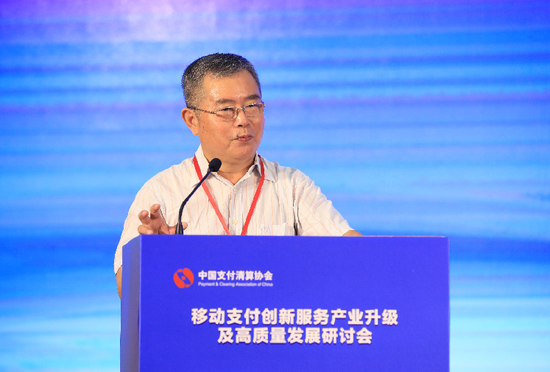Viewpoint | Libra needs to go a long way to become a currency

Sina Finance News July 12 news, mobile payment innovation service industry upgrade and high-quality development seminar was held in Beijing today, Li Yang, member of the Chinese Academy of Social Sciences, and director of the National Finance and Development Laboratory attended and delivered a speech. He pointed out that under the new development trend, we must work hard to improve the construction of industrial ecosystem and contribute to the improvement of China's payment infrastructure. There must be a value-added region that can win-win between enterprises, banks, non-bank financial institutions, clearing organizations, software and hardware providers, entities, public departments and residents. This can completely become a new payment ecosystem. Important pivot.
Speaking of the hot Libra, Li Yang said that Libra needs to go a long way to become a currency. He believes that money is the sovereignty of a country, and the big country will never give up control of monetary sovereignty. Libra's currency exists in two systems, a set similar to SDR, which weights certain currencies with a certain weight to form an asset package. The other is to reinvest the funds it raises into a series of highly liquid assets traditionally invested by the central bank, similar to money market funds. In daily operations, whether it is based on a basket of currencies or based on money market funds, this is in conflict. This is the direction Libra still needs to explore.
The following is a record of the speech:
- When does the altcoin catch up with Bitcoin? Not far away
- Opinions | Utilizing the China National Consensus and the Mining Council to deal with bitcoin network issues
- Fed Chairman Powell: Bitcoin is more like gold, it is not impossible to replace the dollar
Distinguished guests, ladies and gentlemen, good morning everyone!
In this wonderful time, experts from the nation dedicated to the development of mobile payment gathered in Beijing to discuss the mobile payment innovation service industry upgrade and high-quality development events, which is very meaningful. By contributing to China's mobile payment, this industry can better support economic development and better benefit the society. Mobile payment represents the direction of the transformation of emerging retail payment instruments, including the efforts of third-party payment institutions and the active participation of traditional banking institutions. The synergy between the two will promote the high-quality development of China's payment industry.
In the past few years, China's third-party mobile payment market has developed rapidly. According to the research results of the National Finance and Development Laboratory in 2019, the third-party mobile payment market has grown rapidly due to the continuous development of new hotspots, and has gradually shaped the modern payment habits of Chinese users. Before 2013, it was the growth rate of third-party payment in China. The reason can be mainly attributed to the leadership represented by Taobao. After 2013, Internet finance has become a new growth point. After 2016, with the launch of the Spring Festival WeChat red envelope as an opportunity, the transfer became the growth engine of the transaction scale. With the development of mobile payment habits under the user's offline, offline payment has become a new growth point. In the process, due to the rapid popularity of smartphones and 4G networks, the development of offline scanning code payment and NFC payment habits has also contributed to the growth of mobile payment scale.
According to the data of the People's Bank of China, in the first quarter of 2019, non-bank payment institutions handled 148.532 billion online payment services, amounting to 58 trillion yuan, up 34.8% and 13.44% respectively, of which mobile payment should account for the majority. It can be seen that the power of the mobile payment industry is strong. In such a high market share, a small number of companies such as Tencent Financial account for a large proportion. This situation reveals the characteristics of the industry structure, and also reveals some possible adjustment directions.
Market research organization Analysys said in the monitoring report of the third-party mobile payment market in the first quarter of 2019 that the overall transaction scale of the industry has maintained steady growth, and the market transaction scale reached 47,698.63 trillion yuan. But we also see that the industry has also entered a seasonal adjustment period. Yisop has also released a research report on third-party mobile payment users in the first quarter of 2019. The report shows that Tencent Financial's Tenpay and other large payment institutions have higher penetration rates, and Tenpay is 89.2. %. According to the number of transactions, Tenpay has a 51% share. The report also found that in the retail, catering, take-away, travel and other consumer transactions, the proportion of TenPay transaction volume also maintained a leading edge.
From the perspective of mobile payments driven by banks and card organizations, in the first quarter of 2019, banking institutions handled 19.69 billion mobile payment services, amounting to 86.62 trillion yuan, up 79.6% and 22.32% respectively year-on-year, and also showed rapid growth.
Driven by the joint efforts of all parties in the industry, the number of unified APP users in the banking industry has grown rapidly, and the functions and user experience have continued to improve.
For the industry, there is a question that needs to be answered: in the context of the reform of financial instruments, how mobile payments serve the development of the industry. The following four aspects can be the starting point for further development:
First, directly improve transaction efficiency, reduce transaction costs, and promote household consumption.
Second, efforts should be made in the areas of food, clothing, housing, medical care, education, etc. to improve service efficiency and fully meet the increasingly diversified and convenient needs of residents.
Third, to improve the efficiency of payment, sneak into the company's cash flow management, financial environment optimization, accounting processing and other fields.
Fourth, comprehensively tap the effectiveness of big data, relying on payment to obtain a large amount of valuable information, and better information management.
Under the new development trend, we must work hard to improve the construction of the industrial ecosystem and contribute to the improvement of China's payment infrastructure. There must be a value-added region that can win-win between enterprises, banks, non-bank financial institutions, clearing organizations, software and hardware providers, entities, public departments and residents. This can completely become a new payment ecosystem. Important pivot.
Not long ago we met Libra's challenge. Facebook launched it and claimed it was a cryptocurrency, but it still has a lot of entanglements. But preliminary research shows that Libra is likely to pay for our biggest and most direct impact. Just like the emergence of various Internet-based third-party payment companies in the past, it first impacted this business, and this business may also be the weakest and most marginalized place in the existing regulatory system. At the same time, for financial researchers, this is also likely to be the core place.
Libra still has to go a long way to become a currency. Money is the sovereignty of a country, and a big country will never give up control of monetary sovereignty. Libra's currency exists in two systems, a set similar to SDR, which weights certain currencies with a certain weight to form an asset package. The other is to reinvest the funds it raises into a series of highly liquid assets traditionally invested by the central bank, similar to money market funds. In daily operations, whether it is based on a basket of currencies or based on money market funds, this is in conflict. This is the direction Libra still needs to explore.
But Libra covers 2.7 billion people, an economically active population outside China's 1.4 billion population, and it has a large advantage in cross-border multi-currency payments. More importantly, Libra is based on social portals such as Facebook, Google, and Twitter. In the past, we built a network great wall around the territory of the People's Republic of China. It is under this protection that we have made great progress. In the future, we will face real challenges when working with foreign payment agencies.
In summing up past achievements and experiences, the mobile payment industry must also remain conscious. Under the new situation and new situation of globalization, we are faced with new tasks and new challenges. We must win by war, otherwise the consequences will be unimaginable. I believe that after many years of development, with strong political security, we have the ability and confidence to gain an advantage in the new competition. Thank you all!
Source: Sina Finance
We will continue to update Blocking; if you have any questions or suggestions, please contact us!
Was this article helpful?
93 out of 132 found this helpful
Related articles
- Oil giant Shell invests in US venture capital LO3 Energy to explore blockchain power platform
- Trump Trump: Data shows that "air" bitcoin wins over the dollar
- Comments | Lying Trump: What he is against is not a cryptocurrency at all.
- Let the dollar be great again? Trump "declared war" bitcoin and Libra, but led to siege
- Compared with the original chain CFO Li Zongcheng: a commercial era with Blockchain
- Encrypted currency and class crossing (4): elite class, bitcoin battle, petty bourgeoisie is the biggest loser
- HKEx will start blockchain bidding






